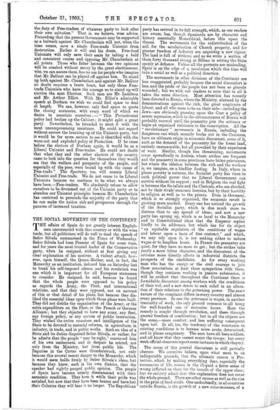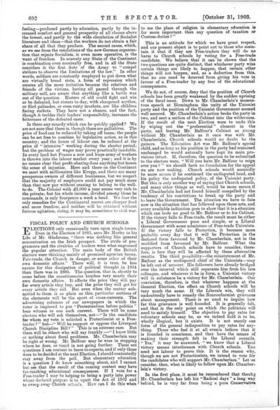THE SOCIAL MOVEMENT ON THE CONTINENT.
THE affairs of Spain do not greatly interest English- men unconnected with that country or with the wine trade, but all politicians will do well to read the speech of Setior Silvela summarised in the Times of Wednesday. Senor Silvela had been Premier of Spain for some time, and for years the most trusted leader of the Conservative party, when he resigned, without at first giving any clear explanation of his motives. A violent attack, how- ever, upon himself, the Queen-Mother, and, in fact, the Monarchy as an institution, induced him on Saturday last to break his self-imposed silence, and his revelation was one which it is important for all European statesmen to consider. He resigned, he said, because he found that the whole people were opposed to his policy as regards the Army, the Fleet, and international relations, and that they were opposed, not on account of this or that detail of his plans, but because they dis- liked the essential ideas upon which those plans were built. They did not dislike the organisation of the Army, or the extra expenditure on the Fleet, or the French or German Alliance ; but they objected to have any army, any fleet, any foreign policy, or any system of public instruction. They wished the entire resources and intelligence of the State to be devoted to material reforms, in agriculture, in industry, in trade, and in public works. Such an idea of a State and its duties disgusted Senor Silvela, or rather, for he admits that the people " may be right," convinced him of his own uselessness, and in despair he retired, not only from the Ministry, but from public life. The Deputies in the Cortes were thunderstruck, not only because this avowal meant danger to the Monarchy, which it would seem holds firmly by Senor Silvela's ideas, but because they knew, each in his own district, that the speaker had rightly gauged public opinion. The people of Spain have become utterly discontented with their economic condition. They bore it while their pride was satisfied, but now that they have been beaten and have lost their Colonies they will bear it no longer. The Republican party has revived in its full strength, which, as our readers are aware, has, though Spaniards are by, character and history essentially Monarchical, before this upset the throne. The movements for the redistribution of the soil, for the secularisation of Church property, and for greater freedom of industry are acquiring a new vigour, The land is full of strikers, and as we write a section of them forty thousand strong at Bilbao is setting the State openly at defiance. Unless all the portents are misleading Spain is on the edge of a revolution which this time will take a social as well as a political direction.
The movements in other divisions of the Continent are less exaggerated, probably because the social discomfort is less, and the pride of the people has not been so gravely wounded ; but we wish our readers to note that in all it takes the same direction. Most attention has recently, been directed to Russia, where the Ministry, alarmed by the demonstrations against the rich, the great employers of labour, and all who seem to be on their side—including the Jews—are obviously pressing upon the Czar a policy of severe repression, which in the circumstances of Russia will probably succeed until the peasantry join the artisans or begin an organised resistance to the conscription. All the " revolutionary " movements in Russia, including the dangerous one which recently broke out in the Caucasus, have an ultimate origin in economic discontent, some of it, such as the demand of the peasantry for the forest land, entirely unreasonable, but all provoked by their experience of want. Similar, though less threatening, movements occur sporadically in Austria, where strikes are frequent and the peasantry in some provinces have bitter grievances, but where the relation between the rich and the workers is, we imagine, on a kindlier footing. In Italy, where in places poverty is extreme, the Socialist party has risen to, such political power that no Liberal Government can survive without its support ; and in Belgium the real fight is between the Socialists and the Clericals, who are shocked, not by their rivals' economic heresies, but by their hostility to religion as well as to the priests. Even in Germany, which is so strongly organised, the economic revolt is growing more marked. Every one has noticed the growth of the Socialist party, which is due much more to distress than to any spread of ideas; and now a new party has sprung up, which is so loyal to the Monarchy and to Constitutional ideas that the Emperor replies kindly to its addresses, but which has for its object " an equitable regulation of the conditions of wages and labour upon a basis of free contract," and which, we may rely upon it, is not seeking either to reduce wages or to lengthen hours. In France the peasantry are quiet, for they have no more to get ; but the strikes take yearly a more bitter character, and the discontent of the artisans more directly affects in industrial districts the prospects of the candidates. As for every working man who has the energy or the civil courage to join these associations at least three sympathise with them, though they continue working in passive submission, it will be evident that throughout the Continent there is formidable discontent among workers with the conditions of their toil, and a new desire to seek relief in an altera- tion of their relations to the governing power. The exact nature of the complaint differs in every country and almost every province. In one the grievance is wages, in another insecurity of work, the only ground common to all being the well-founded one of excessive hours. Here the remedy is sought through revolution, and there through greater freedom of combination ; but in all the objects are the same,—more comfort, and less suffering consequent- upon toil. In all, too, the tendency of the resistance to existing conditions is to become more acute, determined, and in places sanguinary. The men have all been soldiers, and all know that they cannot resist the troops; but every week official observers report some instance in which they try.
The cause of this general discontent is still partially obscure. We ourselves believe, upon what seem to us indisputable grounds, that the ultimate reason is Pro- tection. which by making everything dear, especially the' necessaries of life, rouses in the ill-paid a fierce sense of wrong inflicted on them for the benefit of the upper class; but we entirely admit that this explanation does not cover the whole ground. There are other causes as well as the rise in the price of food-stuffs. One undoubtedly, in all countries outside Russia, is the growth of a new consciousness, of a feeling—produced partly by education, partly by the in- creased comfort and general prosperity of all classes above the lowest, and partly by the wide circulation of Socialist literature and ideas—that the workers do not obtain a fair share of all that they produce. The second cause, which, as we see from the resolutions of the new German organisa- tion that rejects Socialism, is even more operative, is the want of freedom. In scarcely any State of the Continent is combination even nominally free, and in all the State considers it the first duty of the Army to " compel strikers to observe the limitations of the law." In other words, soldiers are constantly employed to put down what are virtually bread riots, a form of repression which creates all the more irritation because the relatives and friends of the victims, having all passed through the military mill, are aware that anything like a battle was out of the question. Rioters of old could fight and win or be defeated, but rioters to-day, with sharpened scythes, or filed palisades, or even rusty muskets, are like children facing rockets. They have not a chance, and the fact, though it trebles their leaders' responsibility, increases the bitterness of the defeated caste.
Is there any remedy which can be quickly applied ? We are not sure that there is, though there are palliatives. The price of food can be reduced by taking off taxes; the people can be set free to combine by legislative action, as in this country; and the hours of labour can be reduced at the price of " intensive " working during the shorter period; but the problem of wages may prove practically insoluble. In every land but France a new and huge army of workers is thrown into the labour market every year ; and it is by no means clear that profit-sharing does anything but lessen the sense of injustice. Here and there on the Continent we meet with millionaires like Krupp, and there are many prosperous owners of different businesses, but we suspect that the majority of employers could not pay much more than they now pay without ceasing to belong to the well- to"-do. The Colonel with £1,000 a year seems very rich to the private; but his whole income, divided among those he commands, is only fourpence a week a head. We fear the only remedies for the Continental unrest are cheaper food and more freedom, and neither will be obtained without furious agitation, rising, it may be, sometimes to civil war.



















































 Previous page
Previous page